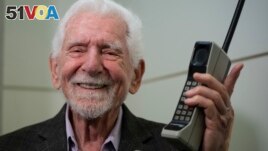05 April 2023
The first cellphone was invented fifty years ago this week. The man who built that phone, Martin Cooper, is now 94 years old.
Cooper, who has been called the "father of the cellphone," has been speaking with the media as he looks back at his efforts to create a device that greatly changed our world.
In the early 1970s, Coper worked for American technology company Motorola. At the time, Motorola and other manufacturers were attempting to create wireless phones that could work in vehicles and also be carried.

FILE - Martin Cooper, the inventor of first commercial mobile phone, poses with a Motorola DynaTAC 8000x during an interview with The Associated Press at the Mobile World Congress 2023 in Barcelona, Spain, Feb. 27, 2023. (AP Photo/Joan Mateu Parra)
There was intense competition between Motorola, Bell Labs and AT&T to build the first truly portable phone. The technology used to create the first cellphone is known as cellular. This technology uses many small, interconnected transmitters that give off wireless signals and connect cellphones to the internet.
Cooper made the first public call from a handheld portable telephone in New York City on April 3, 1973. The device, called Dyna-TAC, weighed about 1 kilogram and was 28 centimeters long.
He developed the phone with his team at Motorola over a period of five months. The first model permitted about 25 minutes of talk time. Cooper noted that such a talk time was not a problem, since "This phone was so heavy, you couldn't hold it up for 25 minutes."
Speaking about that moment to The Associated Press, Cooper said, "The only thing that I was worried about: ‘Is this thing going to work?' And it did." Cooper admitted that at the time, "We had no way of knowing this was a historic moment."
While Cooper is pleased that his invention has opened up a series of technological possibilities for cellphone users, he thinks many people are just too obsessed with their devices.
"I am devastated when I see somebody crossing the street and looking at their cellphone. They are out of their minds," Cooper told the AP. "But after a few people get run over by cars, they'll figure it out," he joked.
Today, Cooper uses a late model iPhone. He likes that the phone permits him to do numerous things, such as read emails, watch YouTube and control his hearing aid devices. But mostly, he says he uses the phone just to talk to people.
Cooper said the modern progress of cellphones is sure to continue long into the future. He predicts phones will develop to the point of being able to be "distributed on your body," with sensors "measuring your health at all times."
Cooper said batteries could even be replaced by human energy. "You ingest food, you create energy. Why not have this receiver for your ear embedded under your skin, powered by your body?" he imagined.
But the cellphone inventor has also expressed worries about how the device has created serious risks for users, especially in the area of privacy. "My most negative opinion is we don't have any privacy anymore because everything about us is now recorded someplace," Cooper said.
But, he noted he is hopeful that cellphones will continue to progress in ways that can greatly help humanity. "Each generation is going to be smarter...They will learn how to use the cellphone more effectively," Cooper said. "Humans sooner or later figure it out."
I'm Bryan Lynn.
Bryan Lynn wrote this story for VOA Learning English, based on reports from The Associated Press, Agence France-Presse and Dyna LLC.
_________________________________________________________
Words in This Story
cellphone – n. a mobile phone
portable – adj. able to be carried
transmitter – n. a piece of equipment used to send out signals for radio, television, telephone, etc.
obsessed – adj. to think about something or someone all the time
devastate – v. to destroy or damage something very badly
distribute – v. to give something out to people or places
battery – n. an object that provides electricity for things such as radios, toys, cars, etc.
embed – v. to fix something firmly into a substance
negative – adj. not expecting good outcomes